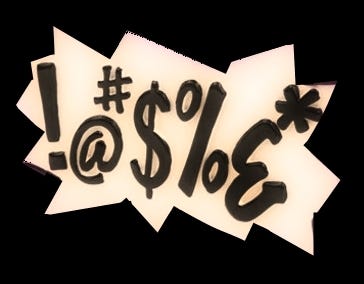Journalist Andrea Vance whipped up a shitstorm on these prim shores a couple of weeks back when she posted an article decrying the Government’s shutting down of pay equity claims for a host of female-dominated professions.
That the process was spearheaded by a female Minister of Finance made Vance’s blood seethe even more than it might have. “Turns out you can have it all,” she wrote, referencing a once-popular slogan among those championing women’s causes. “So long as you’re prepared to be a c... to the women who birth your kids, school your offspring and wipe the arse of your elderly parents… .”
The reaction was predictable. Members of Parliament from both sides of the political and gender divide called Vance’s language despicable, gendered, patronising and misogynistic. (She’d also used phrases like “girl math” and “girl bosses”, and the fact she’d elided the c-word didn’t seem to reduce anyone’s outrage).
So loud was the noise over Vance’s use of c…, that the matter of shitty pay rates for women became almost an afterthought.
Vance refused to back down, dubbing it “faux outrage”, “choreographed fragility” and “weaponised offence”.
As far as Parliament goes, I think she may have been spot on. With the alacrity of a rich bastard in a BMW XM Label changing lanes without indicating, the ruling National Party leapt on the opportunity to distract everyone’s attention from their own behaviour, which included rushing the bill through under urgency to avoid public debate.
But people outside Parliament were also horrified, many of them, one assumes, with no political axe to grind. Even former Prime Minister Helen Clark, not known for leaping into partisan debates these days, called Vance’s use of c… unacceptable.
Which raises an interesting question. Why is it that insults based on male genitalia like dick and prick cause much less offence than cunt (or even c…)? Why, when Te Pāti Māori’s Rawiri Waititi said last November that the Prime Minister may have “no balls and be a drop-nuts” if he didn’t attend Waitangi Day, did that insult receive so little airplay?
Rawiri Waititi, inventor of Waititi’s Testicular Paradox: One can have no balls while also being a drop-nuts.
Before we go there, you should know that cunt wasn’t always unmentionable. Until the 1400s, you’d find it in respectable medical texts. By the 1500s it was no longer used in polite speech, but it took until the 1700s for it to be regarded as obscene and the 1920s for it to become an insult.
(It can also be used as one part of a host of insults of varying offensiveness and floridity. Interested readers will find more at Green’s Dictionary of Slang.)
Prick also waited for the 1920s before adopting its role as an insult. Its first recorded use as slang for penis is from the 1590s, but Chaucer had used it a couple of centuries earlier as a synonym for “have sex with”.
Feminists themselves are divided on whether cunt should be taboo. In the 1980s, Germaine Greer was an outspoken advocate of women reclaiming the word (she saw vagina as a male word that reduced the female body to a receptacle), but more recently she has called it “the most offensive insult one man could throw at another”, and suggested it’s “a word of immense power, to be used sparingly.”
I get (I think) why women might find it particularly offensive. When you’re a member of a group that’s been dominated by another for centuries, often violently, to then have the name of part of your body - for some, the most sacred or intimate part - used as an insult might surely feel like yet another act designed to keep you in your place.
But even if true, that can’t be the whole story. Many who regard cunt as an especially bad word have little interest in women’s rights. Is there a Madonna-whore complex at play? Does my freedom as a man to use prick as an insult grant me an advantage over women, who are denied the same freedom to use cunt?
It also raises the issue of taboos in general. Cunt was for many years a term of respect. That it’s become unspeakable in many quarters suggests that taboos against certain words are a baked-in feature of society, the only question being which words will be taboo at any given time.
It’s not just words, either; harbouring certain thoughts is verboten in most cultures and within subcultures. I grew up in a faith where to question the existence of God placed one’s soul in mortal danger. A trend in the circles I now frequent is a growing intolerance of apparently illiberal thoughts, such as that sex is binary or that the Holocaust didn’t happen. It’s not that such thoughts will be met with strong disagreement or revulsion; it’s that even entertaining them is forbidden. So strong are such taboos, that merely pointing out their existence can provoke anger.
I learned this lesson as a pre-teen. One day my brother and I were fighting over a rugby ball on the front lawn when he said “no cunt’s going to get this ball except me”. Thinking this was hilarious, but not knowing what cunt meant, I relayed the story at the family dinner table. The reaction was instant: my mother froze and my father’s face turned grim. In a voice that was equal measures menace and disgust, he growled, “we don’t use that word in this house.”
I’d crossed two lines. The first was using that word. The second was putting my parents in a position where they were forced to say we don’t use that word.
Larger minds than mine have tried to understand why taboos exist and why they’re rarely discussed openly. While a handful - like that against incest - serve an obviously useful purpose, most don’t. Are they there, then, to provide social glue? To ensure social order? To repress our darkest desires so we don’t have to confront them? To provide comforting explanations for a seemingly random world?
I have no answer. One thing I’m sure of, however, is that Andrea Vance knew exactly what button she was pushing when she wrote c…. She was mightily pissed off, and she chose language that captured her anger and was sure to get a strong reaction.
Was it unacceptable? One thing that troubles me is how her language echoes the vile abuse that former Prime Minister Jacinda Ardern endured from the worst kind of men. New Zealand women leaders - maybe female leaders everywhere - have targets on their back and no shortage of woman haters dying to shoot at them. And cunt ranks high on the list of insults they choose to do their nasty work.
Maybe that’s not Vance’s problem. It’s also worth noting that she didn’t call anyone a cunt - she accused them of behaving like one. It may be a fine point, but I think it’s one that matters. The difference is clear if you’re arguing with your partner and are choosing whether to say “you’re being an arsehole” or “you are an arsehole”. One’s a statement about your partner’s behaviour; the other is a claim about who they really are.
Nor should rhetoric always be pretty and polite. If you want to be heard, if you want to cut through the noise and the complacency and the resignation, it pays to know which levers to pull - and be willing to take the knocks that come with that. On the evidence so far, you’d have to say Vance is.
For that, and for standing with the marginalised against a shameful government action, she has my respect. Maybe not my agreement about which levers she chose to pull, but my respect nonetheless.
Bits and specious
Another journalist’s perspective on Vance’s piece and on gendered insults in general. And another here from a linguist.
In 1996, AOL’s profanity filter - for a reason that will become obvious - refused to allow people in the English town of Scunthorpe to create AOL accounts. Google’s SafeSearch repeated the mistake in the early 2000s.
I wonder how the residents of Shitterton, England fared in each case? Or Ballplay, Alabama; Fort Dick, California; Cumming, Georgia; The Tits, New Zealand; or Pisspot Creek, Tasmania.
Those symbols you sometimes see used instead of forbidden words (#@$%!) are called grawlixes. According to Merriam-Webster, the word was invented by cartoonist Mort Walker of Beetle Bailey fame. Walker, however, attributed it to Charles D. Rice of This Week magazine. So who the #@$* knows who really who invented it?
Quote of the week
Under certain circumstances, urgent circumstances, desperate circumstances, profanity provides a relief denied even to prayer.
Mark Twain






Interesting piece, Ken, thanks for writing about it. For what it's worth, the two things that came to my mind are the current rules about "safe speech" being implemented by places like TikTok which is resulting, predictably, in a bunch of new slang and ways of talking around the prohibited words. The second thing is something that happens a lot in the States (where I'm from) about who's allowed to use which words, which is gatekeeping at best and disenfranchising at worst. The reason both come to mind is that they are so often deliberately performative, people getting outraged over others' language because it gives them an excuse to ignore what the person actually said and to generate enough static that the possibly necessary use of the taboo word gets drowned out, which, as you said, is what seems to have happened here. And I guess the flip side of this is that when we use shocking language to make a point, we run the risk of having bad actors throw it back in our face as a way of diminishing us. Again, as you said may have happened here. It creates this vicious cycle where we have to be better than the antagonizers or risk being overwhelmed by them. In this moment of cultural and political upheaval, the deliberate focusing on others' language to police them instead of address their grievances seems to be one of the most potent weapons certain groups have available and that makes them very...well, we have to police ourselves, don't we? And that just sucks.
I still remember when I first heard it on tv & it wasn't even late...slipped by the censor perhaps, about 12 yrs ago.
As a subscriber I emailed Stuff asking for 1 good reason I shouldn't cancel...Tracey Watkins replied some time later with a long-winded reply that I haven't read. The word doesn't offend but the target did, the vehicle did, the hypocrisy did. I emailed for the bluff/mischief.
I also recall when the NYT's legacy science reporter got cancelled for 'nigger' on a field trip, having been asked about its use-in-context by a student who then complained.
Sex is binary...